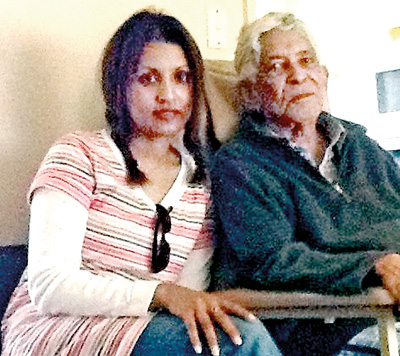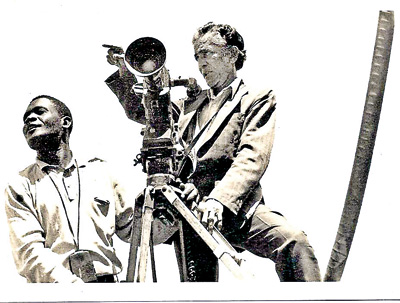Losing Dad to Alzheimer’s
When my dad was diagnosed with Alzheimer’s it was common for him to forget the names of family, his grandchildren and friends.We would put it down to old age and joked about it. But it was when these signs started to be more frequent that it hit us as something serious, and dad was diagnosed with dementia. The dementia gradually made dad mentally and emotionally regress. He forgot how to do simple tasks like making a cup of tea, and we found him doing things like pouring coke into his glass of red wine and drinking it.

Marie with her father Leslie Mark Bartholomeusz
I remember spending time with dad listening to him talk about his love for Sri Lanka where he grew up, and his travels in Europe and Africa. His adventures filming in remote villages in Sri Lanka and Zambia fascinated us children, and we enjoyed hearing these stories that we had already heard so many times.
Dad progressively forgot how to speak English. He was a Producer/Writer for the Sri Lanka Broadcasting Corporation and worked as a Documentary Film Director filming the Vanishing Veddahs and several other documentaries prior to moving to Zambia with the family for a short stint making documentary films for President Kaunda on Humanism, subsequently working for Malachite Films, the Mining Industry Film Unit in Zambia as a Scriptwriter/Director. He was also an author. As Dad’s dementia escalated, we found him reverting to Sinhala. Often his sentences were jumbled and made little sense in English or Sinhala.
There were times when dad recognised me walking through the front gate when I visited them and greeted me at the door with a big smile. I couldn’t hide my happiness, informing my sisters how he still remembered my name. And then there were the times when I may have been the queen or a stranger, he would just stare right through me like I did not exist. Hiding my heartache, I would sit next to dad holding his hand, and immediately I would see him smile, that all-too familiar smile.
My mum was insistent on caring for dad at home and did an exemplary job taking care of him. When dad was hospitalised for a bacterial infection he had to be cared for closely to manage the wandering and paranoia that comes with dementia, particularly in a different environment. Visiting dad in hospital made me think about the cycle of life. One day when mum and I arrived in hospital dad was almost off the bed insisting on going home with his limited communication in a disoriented state, panicking and clearly didn’t know where he was. His face lit up seeing mum and me, and the confusion eased as she put her hand in his and told him that he would be alright, and that he would be going home soon. I could see that he felt safe.My mind flashed back to being a little girl and dad’s presence, the comforting sound of his typewriter softly tapping away late at nights or early mornings making me feel safe.
Dad deteriorated from this point. When he returned home, it was only because the hospital wanted to transfer him to a high care dementia facility in Melbourne, and my mum would not hear of it.
She refused to move dad into more permanent care, taking on the onerous task of caring for him 24 hours a day with support from the hospital and carers as he needed help with almost everything. The bacterial infection did not go away, and dad began complaining of severe pain. The dementia made it impossible for dad to communicate with us, and the doctors and nurses caring for him found it difficult to tailor appropriate treatment for him.Eventually, the palliative care team was called in to manage the pain. Dad gradually refused to eat. Mum tried everything but he refused to eat for days, taking just drops of water. He was losing the ability to swallow.

In happier days: Leslie Mark Bartholomeusz behind the camera
It was an extremely exhausting and heartbreaking process watching dad and also seeing my mum’s dedication exuding love and compassion to the man who was once her pillar of strength. In his final weeks, I saw dad often, and each day I would leave wondering how long we could watch him battle life. I didn’t know how mum did it, although we could see the pain written on her face.
It was heartbreaking dealing with the pain that he did not remember us his children, nor my late sister Ramani, his first born, whom he had mourned until his dementia set in. Equally, it was difficult seeing my dad who I remember to always be dressed immaculately, independent, in control and so eloquent, years later needing someone to dress him, feed and do everything for him.
So we thought it merciful when dad passed away, and in many ways we were glad he was no longer suffering; his pain and feelings of confusion with this world were over. But two years on I still miss him terribly, the faith and strength he gave us emerging not from might but from insight, self-responsibility and tenderness, with that care for others, and the resilience to deal with what life throws at us.
We will continue to celebrate dad’s life and remember the very generous, inspiring and dignified caring man he was.
| Family disease Alzheimer’s is a common form of dementia, a group of disorders that impairs mental functioning. It is often called a family disease as the chronic stress of watching a loved one gradually decline affects everyone in the family. |


